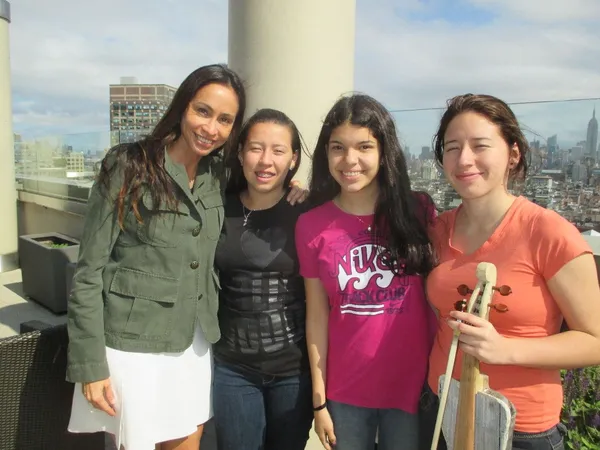 |
| Alejandra Amarilla with Recycled Orchestra members Noelia Ríos, Azucena Azcona and Ada Ríos Photo: Anne-Katrin Titze |
There is Jane Pollard and Iain Forsyth's buoyant 20,000 Days On Earth on Nick Cave and the Bad Seeds with Kylie Minogue, Warren Ellis, Blixa Bargeld and Ray Winstone, and Morgan Neville's far-reaching The Music Of Strangers: Yo-Yo Ma and the Silk Road Ensemble. Now comes the Landfill Harmonic, directed by Brad Allgood and Graham Townsley, co-directed and co-produced by Juliana Peñaranda-Loftus, where the Recycled Orchestra of Cateura, Paraguay, conducted by Favio Chávez, meet Megadeth's David Ellefson, Dave Mustaine, Shawn Drover, and Chris Broderick to perform with them Symphony Of Destruction.
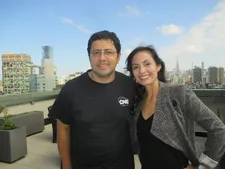 |
| Producer and co-director Juliana Peñaranda-Loftus on Favio Chávez: "I saw the potential in Favio." Photo: Anne-Katrin Titze |
Juliana Peñaranda-Loftus, co-producer Alejandra Amarilla, musical director Favio Chávez and members of the Recycled Orchestra met with me for a conversation on the roof deck of a downtown hotel in New York City the morning before the orchestra's performance at the United Nations.
The creative spirit displayed by the young, adventurous musicians in the Landfill Harmonic is a joy to behold. Instruments built from material gleaned from the Cateura landfill that is used for the dumping of garbage from Asunción, the capital city of Paraguay, change the life of those who live in poverty into a journey of discovery.
Anne-Katrin Titze: Tell me how it all began! You were the one who discovered Favio and the orchestra?
Alejandra Amarilla: I was born in Asunción in Paraguay and I've been living here approximately 17 years and I wanted to find a way to make Paraguay known. A lot of people didn't know where Paraguay is and I knew my country needed a lot of support. I initially thought about making a documentary about Paraguay to bring some awareness on the issues that we have. This is when I contacted Juliana Peñaranda - she is a producer and the co-director of Landfill Harmonic.
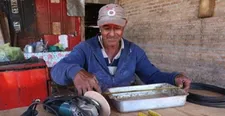 |
| Colá Gomez, Recycled Orchestra luthier and more: "And we always knew that we wanted Colá in the beginning of the film." |
We went to Paraguay in 2009 in search of a story. Luckily, in one of our last interviews, someone mentioned Favio [Chávez] and the work that he was doing with the children. I asked to meet him, and the next day we were able to meet him and see the work that he was doing and the instruments. It was fascinating to see that and that nobody knew about it. That's when we decided to film that story.
AKT: Juliana, you were also there at this initial meeting. Did you also know right away that this was it?
Juliana Peñaranda-Loftus: Alejandra is the one who fell in love with the story, I saw the potential in the characters first. I saw the potential in Favio. The question was, is Favio going to stick with us for a few years? Because we all know that making a documentary takes time. We discussed it and said this is the story. We believed that Favio is going to stick with the kids and is coming back to Cateura.
AKT: I loved the way you begin the film with the making of the instruments by Colá [Gomez], the craftsmanship. How did that come about?
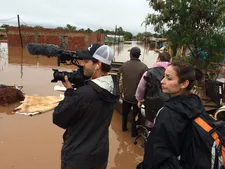 |
| Brad Allgood filming the flooding of Cateura with Juliana Peñaranda-Loftus |
JPL: It took a while. It took probably at least two months that we kept changing the first ten minutes of the film. It was a discussion how can we make it interesting for the audience. Should we reveal the concerts? Should we reveal that they will be famous? We needed to establish Cateura but we also needed a hook.
AA: And we always knew that we wanted Colá in the beginning of the film.
AKT: How is he doing?
AA: He is good. He saw the film now for the first time after all these years. It was his first time watching the film at the premiere we did in Cateura. He was very very happy and emotional about it.
AKT: The journey started with Favio being an environmental technician coming to the landfill to work on a recycling project. What I felt throughout the whole film is that instead of shame, there is pride. It's a very strong message.
AA: You know, being in this process in all these years, we could see the strength in people. That was something that kept us also inspired throughout the production of the film.
AKT: There is a quote in the film - "If you're born in the wrong place, you don't have the right to dream."
 |
| Recycled Orchestra: "We believed that Favio is going to stick with the kids and is coming back to Cateura." |
AA: That was one of my favorite lines. I wanted to make sure that was in the film, remember, Juliana? I thought that was such an important phrase. You see that as you see a child on a little string, playing as if it were a hammock. That's what he [Favio] is saying. Living in those circumstances, these children don't even know if they can dream. And throughout the film you see that, yes, they can dream. They can transcend their environment, these limitations that they have.
AKT: The video clip of them was posted in 2012. Did that completely change everything?
JPL: Yes. We felt that we needed support and we knew the story had a great potential. So we thought, maybe if we show a little teaser of the film, we will get the support that we need to keep going with the production. It opened up a few grants that we needed and the kids started to get invitations abroad. It changed the story for them and for us. It was fantastic. Thanks to the internet we can do these things now.
AKT: The second huge turning point that takes the film to a whole new level is the disastrous flood. You have an early interview with Ada's grandmother talking about past floods in the region as something that doesn't happen anymore. And then it does in June 2014.
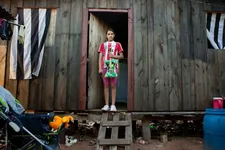 |
| "Tania's home was absolutely devastated as well." |
JPL: I love that you mention that! We didn't know that when she was saying it. When the flood happened, we knew we had to use that part because it was going to bring together the whole thing.
AA: We were done with production at that point. We had to reopen production in order to send a skeletal crew to Paraguay. It was Juliana and Brad Allgood to film what was going on at that moment.
JPL: We had a fine cut by then. We didn't have the funding but we decided that it was so important to see how they were facing the reality. We needed to see how the community was going to respond to it. That was the third act of the film. We changed the third act of the film when the flood happened.
AKT: It brings it back to the idea at the beginning, recycling, the environment.
JPL: Climate change!
AA: The importance of community work and support.
AKT: And very plainly with recycling and dealing with our garbage. I am part of what is still only a pilot program for composting here in New York City - a city that produces an insane amount of garbage.
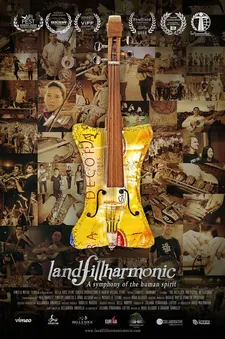 |
| Landfill Harmonic US poster |
AA: The event [the flooding of the Cateura landfill] was very toxic. We wanted to make sure that we had very good images of what really was going on. You see the landfill from on top and you see the devastation of what is going on. That's when you get that we're doing this to our world, to our communities - there has to be a better way.
There has to be a call to action. This was something that brought us together from the beginning. Why are these people living in this area? How are they going to be able to better their life? This is an ongoing issue. We hope also the government in Paraguay takes notice.
AKT: What about all the supporters who in 2012 were seeing that clip? The TV shows and Megadeth and others? Was there support coming in after the flood for the area?
AA: The orchestra received help from certain organizations. Unfortunately, it wasn't as much as we were hoping for. We also tried to help. The production company also donated the funds that we could to help. Colá, for example, was in real need. His home just was devastated.
AKT: He had to sell his pigs?
AA: Yes, all his animals, everything. It was a very very tough situation for most of the kids. Tania's home was absolutely devastated as well.
Coming up - Favio Chávez and members of the Recycled Orchestra on the film Landfill Harmonic, Megadeth, and more.
Landfill Harmonic opens in the US on September 9.
On Saturday, September 10, after the 3:00pm screening of Landfill Harmonic at Cinema Village in New York, Anne-Katrin Titze will moderate a Q&A with the Recycled Orchestra, followed by a musical performance.





















